The history of Egypt has been long and wealthy, due to the flow of the Nile River with its fertile banks and delta, as well as the accomplishments of Egypt's native inhabitants and outside influence. Much of Egypt's ancient history was unknown until Egyptian hieroglyphs were deciphered with the discovery and deciphering of the Rosetta Stone. Among the Seven Wonders of the Ancient World is the Great Pyramid of Giza.

The Suez Crisis also known as the Second Arab–Israeli War, the Tripartite Aggression in the Arab world and as the Sinai War in Israel, was a British–French–Israeli invasion of Egypt in 1956. Israel invaded on 29 October, having done so with the primary objective of re-opening the Straits of Tiran and the Gulf of Aqaba as the recent tightening of the eight-year-long Egyptian blockade further prevented Israeli passage. After issuing a joint ultimatum for a ceasefire, the United Kingdom and France joined the Israelis on 5 November, seeking to depose Egyptian president Gamal Abdel Nasser and regain control of the Suez Canal, which Nasser had earlier nationalised by transferring administrative control from the foreign-owned Suez Canal Company to Egypt's new government-owned Suez Canal Authority. Shortly after the invasion began, the three countries came under heavy political pressure from both the United States and the Soviet Union, as well as from the United Nations, eventually prompting their withdrawal from Egypt. Israel's four-month-long occupation of the Egyptian-occupied Gaza Strip and Egypt's Sinai Peninsula enabled it to attain freedom of navigation through the Straits of Tiran, but the Suez Canal was closed from October 1956 to March 1957.
According to most scholars the history of modern Egypt dates from the start of the rule of Muhammad Ali in 1805 and his launching of Egypt's modernization project that involved building a new army and suggesting a new map for the country, though the definition of Egypt's modern history has varied in accordance with different definitions of modernity. Some scholars date it as far back as 1516 with the Ottomans' defeat of the Mamlūks in 1516–17.
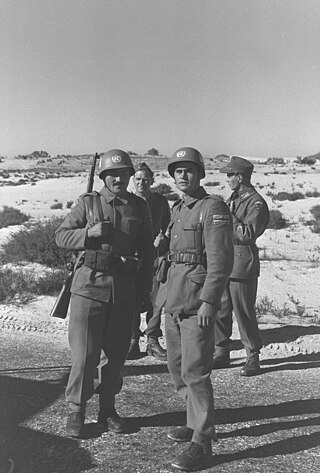
The United Nations Emergency Force (UNEF) was a military and peacekeeping operation established by the United Nations General Assembly to secure an end to the Suez Crisis of 1956 through the establishment of international peacekeepers on the border between Egypt and Israel. Approved by resolution 1001 (ES-I) of 7 November 1956, UNEF was developed in large measure as a result of efforts by UN Secretary-General Dag Hammarskjöld and a proposal from Canadian Minister of External Affairs Lester B. Pearson, who would later win the Nobel Peace Prize for it. The General Assembly had approved a plan submitted by the Secretary-General which envisaged the deployment of UNEF on both sides of the armistice line; Egypt accepted receiving the UN forces, but Israel refused it. In May 1967, Egypt asked that UNEF leave Egypt; as the troops started to evacuate over the next days, Israel invaded Egypt on 6 June 1967, initiating the Six-Day War and causing the death of one Brazilian Sergeant and 14 Indian peacekeepers – 17 other members of UNEF were also injured. The last member of UNEF left Egypt on 17 June.

Egypt and the United States formally began relations in 1922 after Egypt gained nominal independence from the United Kingdom. Relations between both countries have largely been dictated by regional issues in the Middle East such as the Israeli–Palestinian conflict and Counterterrorism. But also domestic issues in Egypt regarding the country's human rights record and American support for the regimes of Hosni Mubarak and Abdel Fattah el-Sisi which the United States had come under controversy for in the aftermath of the 2011 Egyptian Revolution, and with many dissents of the current regime describing Sisi's rule as tyrannical.

Egypt–Russia relations are the bilateral relations between Egypt and Russia. Diplomatic relations between the Soviet Union and Egypt were established on August 26, 1943. Egypt has an embassy in Moscow, while Russia has an embassy in Cairo and a consulate-general in Alexandria.
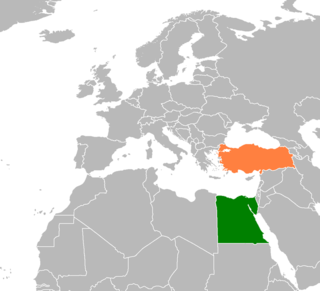
Egypt and Turkey are bound by strong religious, cultural and historical ties, but diplomatic ties between the two have remained extremely friendly at times and extremely strained at others. For three centuries, Egypt was part of the Ottoman Empire, whose capital was Istanbul in modern-day Turkey, despite governor of Egypt, Muhammad Ali, waging war against the Ottoman sultan, Mahmud II, in 1831.

Egypt–Iraq relations have varied over time, alternating from cooperation to rivalry over time. The modern relationship between Iraq and Egypt soured in 1977 when the two nations broke relations with each other following Egypt's peace accords with Israel. In 1978, Baghdad hosted an Arab League summit that condemned and ostracized Egypt for accepting the Camp David accords. However, Egypt's strong material and diplomatic support for Iraq in its war with Iran led to warmer relations and numerous contacts between senior officials, despite the continued absence of ambassadorial-level representation. Since 1983, Iraq has repeatedly called for the restoration of Egypt's "natural role" among Arab countries. In January 1984, Iraq successfully led Arab efforts within the OIC to restore Egypt's membership.

Egypt–Japan relations are foreign relations between Egypt and Japan. Such relations are described by the Egyptian ambassador to Japan as a "very strong friendship", with embassies mutually established. At present, the two nations maintain a cordial relationship with strong economic and trade relations. Since the formal diplomatic relations were established, both countries have kept embassies in each other's capitals, demonstrating a dedication to continued communication and cooperation. Bilateral connections have been strengthened via a history of friendly exchanges and frequent visits between the two countries at different governmental levels. Their interactions are mostly shaped by their economic and trade ties, which include major Japanese investment in Egypt and a thriving exchange of goods and services. This economic involvement is backed by a variety of agreements that ease trade, protect investments, and promote mutual growth. Currently, Egypt and Japan have a friendly and cooperative relationship based on common interests and a commitment to regional stability and prosperity. This connection has grown to include considerable cultural exchanges and educational collaborations, strengthening the two countries' already strong ties.
The History of Republican Egypt spans the period of modern Egyptian history from the Egyptian Revolution of 1952 to the present day, which saw the toppling of the monarchy of Egypt and Sudan, the establishment of a presidential republic, and a period of profound economic, and political change in Egypt, and throughout the Arab world. The abolition of a monarchy and aristocracy viewed widely as sympathetic to Western interests, particularly since the ousting of Khedive Isma'il Pasha, over seven decades earlier, helped strengthen the authentically Egyptian character of the republic in the eyes of its supporters.

Egypt–United Kingdom relations are the diplomatic, economic, and cultural relationships between Egypt and the United Kingdom. Relations are longstanding. They involve politics, defence, trade and education, and especially issues regarding the Suez Canal.
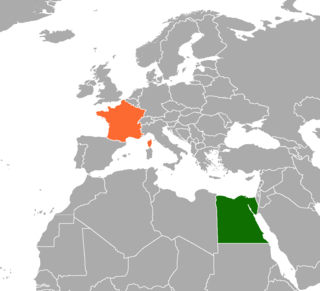
Egypt–France relations, also known as Egyptian–French relations, are the bilateral relations between Egypt and France. Relations between the two countries have spanned centuries, from the Middle Ages to the present day. Following the French occupation of Egypt (1798-1801), a strong French presence has remained in Egypt. Egyptian influence is also evident in France, in monuments such as the Luxor Obelisk in Paris. The relationship is also marked by conflicts like the Algerian War (1954-1962) and the Suez Crisis (1956). As of 2020, relations are strong and consist of shared cultural activities such as the France-Egypt Cultural Year (2019), tourism, diplomatic missions, trade, and a close political relationship. Institutions like the Institut d’Égypte, the French Institute in Egypt and the French University of Egypt (UFE) also aid in promoting cultural exchange between Egypt and France.

People's Republic of China – Egypt relations were established on May 30, 1956.

Egypt–Palestine relations are the bilateral relations between the Arab Republic of Egypt and the State of Palestine. Egyptian President Gamal Abdel Nasser was a strong supporter of the Palestinian cause and he favored self-determination for the Palestinians. Although the Egyptian government has maintained a good relationship with Israel since the Camp David Accords, most Egyptians strongly resent Israel, and disapprove of the close relationship between the Israeli and Egyptian governments.
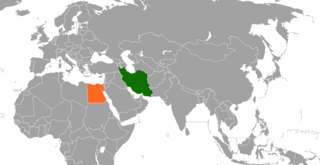
Following the Egyptian Revolution of 2011, Iran appointed its first ambassador to Egypt in almost 30 years. Despite oft-wavering tensions between the two countries, they share membership in the OIC, the BRICS and the Developing 8.
The history of Egypt under Gamal Abdel Nasser covers the period of Egyptian history from the Egyptian Revolution of 1952, of which Gamal Abdel Nasser was one of the two principal leaders, spanning Nasser's presidency of Egypt from 1956 to his death in 1970. Nasser's tenure as Egypt's leader heralded a new period of modernisation and socialist reform in Egypt, along with a staunch advocacy of pan-Arab nationalism, and developing world solidarity. His prestige in Egypt and throughout the Arab World soared in the wake of his nationalisation of the Suez Canal Company in 1956, and Egypt's political victory in the subsequent Suez Crisis, but was damaged badly by Israel's victory in the Six-Day War.

Historically, relations between the Arab Republic of Egypt and the Kingdom of Saudi Arabia could be considered as extending several centuries back to the relations between earlier regimes in Egypt – the highly autonomous Egypt Eyalet in the Ottoman Empire and the Kingdom of Egypt – and the earlier manifestations of Saudi/Wahhabi power in the Arabian Peninsula. Saudi Arabia and Egypt are both highly influential countries in the Arab world. Egypt is the most populous Arab country, and Saudi Arabia is a member of the G20. According to a 2013 Pew global opinion poll, 78% of Egyptians express a favourable view of Saudi Arabia, and 19% express an unfavourable view.

Egypt–Syria relations refers to the bilateral relations between the Arab Republic of Egypt and the Syrian Arab Republic. Egypt has an embassy in Damascus. Syria has an embassy in Cairo. Both countries are members of the Arab League.

On 14 August 2013, the Egyptian police, under the command of then-Defense Minister Abdel Fattah el-Sisi, used lethal force to “disperse” two camps of protesters in Cairo: one at al-Nahda Square and a larger one at Rabaa al-Adawiya Square. The two sites had been occupied by supporters of President Mohamed Morsi, who had been removed from office by the military a little over a month earlier following mass protests against his rule. Initiatives to end the six-week sit-ins by peaceful means had failed, and the camps were cleared out within hours.
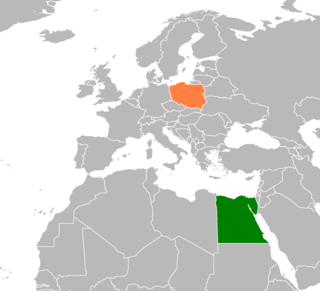
Egypt–Poland relations refers to the relationship between Egypt and Poland. Egypt has an embassy in Warsaw whilst Poland has an embassy in Cairo. Both countries are members of the Union for the Mediterranean, World Trade Organization and the United Nations.

















